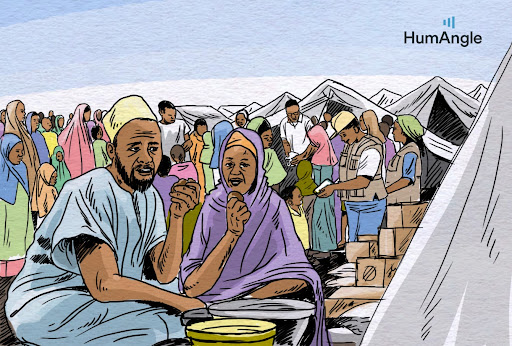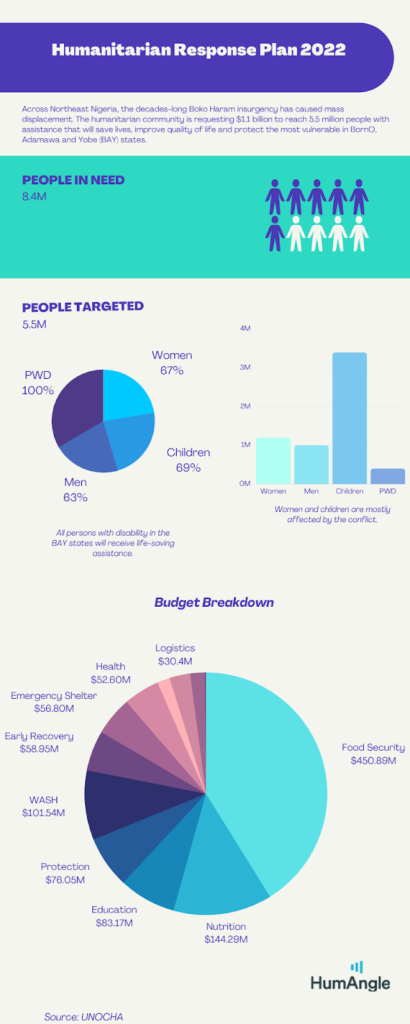Aid Actors Seek $1.1 Billion Assistance For 5.5 Million People In Northeast Nigeria
Across Northeast Nigeria, 8.4 million people are in need of humanitarian assistance and the humanitarian community is requesting $1.1 billion to reach 5.5 million people with assistance that will save lives, improve quality of life and protect the most vulnerable.

Humanitarian actors will need at least US$1.1 billion to provide aid and protection to millions of vulnerable people in crisis-torn Northeast Nigeria in 2022, according to the United Nations.
At least 2.2 million people have been internally displaced and thousands killed in the region, due mainly to Boko Haram’s 12 years-long insurgency.
Some 8.4 million people whose lives have been upended by the ongoing insurgency by the Islamic State’s affiliate in the Lake Chad region are in need of assistance in the worst-affected states of Borno, Adamawa, and Yobe states but only about 65 per cent is targeted, the UN said during the launch of the 2022 Humanitarian Response Plan.
The Plan – a strictly prioritised and comprehensive plan of action – lays out how over 120 partners aim to assist 5.5 million of the most vulnerable people in the areas of education, food, health, protection, shelter, water, sanitation and hygiene.
It seeks to complement the efforts already being undertaken by the Nigerian government and to support the handover of service delivery to local providers, wherever possible.

As a result of conflicts, the number of hungry people in the region continues to rise, food insecurity is exacerbated by conditions such as poverty, inequality, climate change, economic slowdowns, and insufficient policies.
Trond Jensen, the head of the UN Office for Coordination of Humanitarian Affairs in Nigeria, said the coronavirus pandemic and rising prices for food had further exacerbated conditions for millions of vulnerable people.
“The plan is the result of the unwavering commitment by all those involved to ensure that life-saving assistance gets to where it is needed most and also to protect the most vulnerable people,” said Jensen at the launch on Wednesday, Feb. 9.
Since 2014, the UN and humanitarian partners have provided relief and protection assistance worth more than US$3.7 billion. In 2021, aid contributions reached over US$700 million, meeting 69 per cent target of the US$1.01 billion required.
IDPs’ Return
Jensen said that Nigerian authorities have been closing camps for displaced people to return home under the caveat of improved security despite threats of attacks by the terrorists.
Since 2021, the authorities have insisted the displaced persons return home to curb dependence on aid.
HumAngle has observed how the ban on aid in Borno state is stoking severe hunger and pushing displaced persons to consider returning to war-torn areas.
Marybeth Leonard, the United States ambassador to Nigeria, said plans are underway to evaluate high-risk areas and provide support before resettling displaced people.
“We’re so eager to partner with the state authorities to make sure that we have collaborative, consultative, principled decisions about where it is appropriate for people to go, when we can get them there and how we can support them,” said Leonard.
Challenges
Matthias Schmale, the UN Nigeria humanitarian coordinator said access and security remain the significant impediments to aid delivery in the region.
For instance, areas largely controlled by the terrorists are inaccessible. A million of people in these areas have been cut off from aid in areas designated as “hard to reach” or inaccessible to aid workers while about 700,000 of these people are in acute need, according to the UN official.
“By definition, we’re not close to those people, that’s what hard to reach means, so we’re ringing the alarm bell,” said Schmale. “We will try and do our best to expand but it’s really linked to security and access.”
Since the insurgency, aid organisations have been walking on eggshells, and often caught between facing diplomatic rows with the government and threats of kidnappings and summary executions by the terrorists. There were at least 8 fatalities of aid workers in Nigeria in 2021, according to the Aid Workers Security Database.
Support Our Journalism
There are millions of ordinary people affected by conflict in Africa whose stories are missing in the mainstream media. HumAngle is determined to tell those challenging and under-reported stories, hoping that the people impacted by these conflicts will find the safety and security they deserve.
To ensure that we continue to provide public service coverage, we have a small favour to ask you. We want you to be part of our journalistic endeavour by contributing a token to us.
Your donation will further promote a robust, free, and independent media.
Donate HereStay Closer To The Stories That Matter




